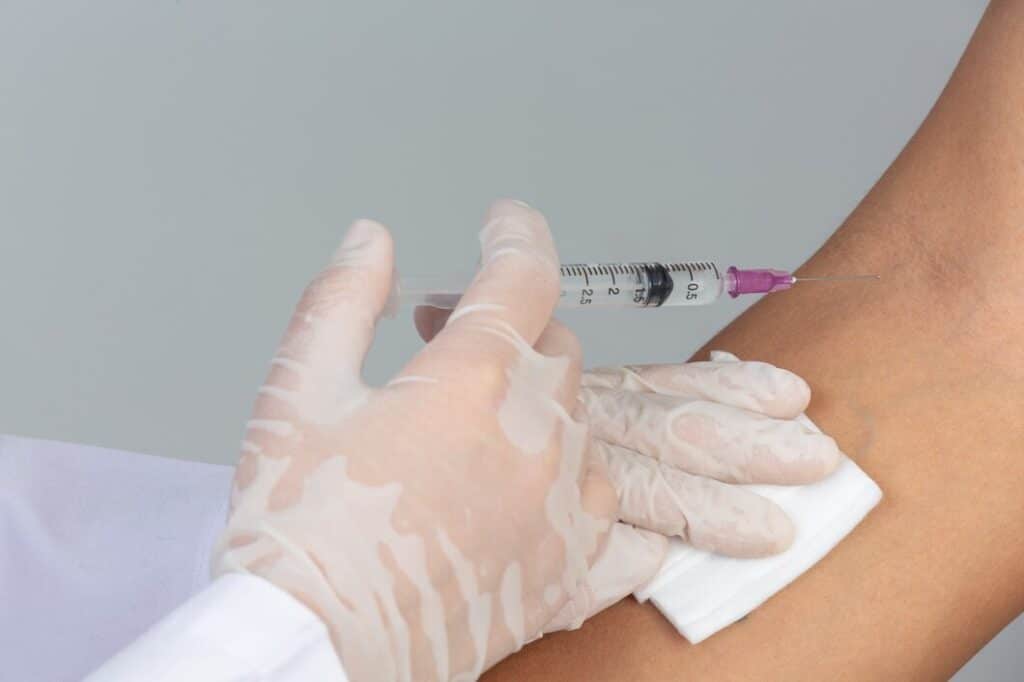Joint Injections in Wilmington - Rheumatology Center of Delaware
We offer the latest quality, state of the art medical care yet in a personable setting. We aim to meld the cutting edge specialist medical care that our clients expect in a comfortable family-oriented atmosphere.
Understanding Joint Injections for Pain Relief: A Comprehensive Guide
Joint pain is one of the most common conditions affecting millions of people worldwide. Whether due to psoriatic arthritis, rheumatoid arthritis, or other joint-related issues, the discomfort can significantly impact one’s quality of life.
Joint injections, including steroid injections, have become a popular treatment option to provide pain relief and reduce inflammation. This article explores the various types of joint injections, their benefits, and considerations for patients.
What Are Joint Injections?
Joint injections are a medical treatment involving the injection of medication directly into the joint. These injections aim to reduce joint swelling, alleviate pain, and improve mobility. They are often used for moderate arthritis conditions, including rheumatoid arthritis and psoriatic arthritis.
The Role of Joint Aspiration
In some cases, joint aspiration may be performed before administering joint injections. This procedure involves removing excess fluid from the joint, which helps reduce swelling and allows for a more effective injection.
Pain Relief for Moderate Arthritis
For individuals with moderate arthritis, joint injections can be a game-changer. By reducing inflammation, these injections can provide significant pain relief and improve function. This makes daily activities easier and more manageable.
TYPES OF JOINT INJECTIONS
Steroid Injections: Cortisone Shots
Cortisone shots are one of the most frequently used types of joint injections. They contain corticosteroids, which help reduce inflammation and provide pain relief. These injections are particularly effective for conditions like rheumatoid arthritis and psoriatic arthritis.Hyaluronic Acid Injections:
Help lubricate the joint, improving mobility and reducing pain, especially for osteoarthritis patients.Platelet-Rich Plasma (PRP) Injections:
Use the patient’s own blood to stimulate healing and reduce inflammation in damaged joints.Stem Cell Injections:
Promote tissue repair and healing by using stem cells to regenerate damaged joint tissues.Prolotherapy Injections:
Regenerative therapy that stimulates healing of ligaments and tendons, often used for joint injuries.Viscosupplementation Injections:
Restore joint fluid in conditions like knee osteoarthritis to reduce pain and improve joint function.Local Anesthetic Injections:
Provide temporary pain relief by numbing the affected joint area, offering quick relief from discomfort.
WHEN ARE JOINT INJECTIONS USED?
Psoriatic Arthritis and Joint Injections
Psoriatic arthritis causes joint pain and skin inflammation. Joint injections can help manage pain and inflammation, improving quality of life.Rheumatoid Arthritis and Joint Injections
Rheumatoid arthritis leads to joint damage and inflammation. Steroid injections help reduce inflammation and provide pain relief during flare-ups.Chronic Joint Pain and Joint Injections
When joint pain becomes persistent, injections can help reduce discomfort and improve mobility.Osteoarthritis and Joint Injections
For osteoarthritis, joint injections like hyaluronic acid restore lubrication and ease pain in affected joints.Sports Injuries and Joint Injections
Joint injections can aid in healing and pain relief for sports-related injuries such as tendon or ligament damage.Failed Conservative Treatments and Joint Injections
When physical therapy or medications don’t provide enough relief, joint injections are an effective next step.Post-Surgical Pain Relief and Joint Injections
Joint injections are often used after surgery to manage pain, reduce inflammation, and enhance recovery.
Risks of Joint Injections
As with any medical procedure, joint injections come with certain risks. While rare, complications such as joint infection, allergic reactions, and cartilage damage can occur. It’s important to discuss these risks with your doctor before deciding on this treatment.
Alternatives to Joint Injections
In some cases, patients may explore alternative treatments, such as physical therapy, exercise, and weight management. These approaches can complement joint injections and help prevent future joint pain.
Sports Medicine and Joint Pain
Sports medicine professionals often work with athletes to prevent and treat joint pain. For active individuals, joint injections may be used to manage sports-related injuries and ensure a quick recovery.
Joint Injections and Fat Tissue
For patients with excess fat tissue in the joint area, it may be necessary to work with a doctor who specializes in joint injections to ensure the injection reaches the targeted site effectively.
OUR MEDICAL CLINIC SERVICES IN WILMINGTON, DELAWARE
WILMINGTON SPECIALIZE IN RHEUMATOLOGY AND INFUSION THERAPY
Our Wilmington facility is committed to providing expert care in rheumatology and infusion therapy. Specializing in the treatment of complex autoimmune and inflammatory conditions, we deliver personalized diagnosis and management to meet your unique healthcare needs. Utilizing state-of-the-art medical technology, our infusion therapy services ensure the safe and effective administration of treatments in a comfortable and professional setting. Trust Wilmington’s dedicated team of specialists to deliver compassionate, high-quality care focused on improving your health and overall well-being.
Rheumatoid Arthritis
Crohn’s
Osteoarthritis
Psoriasis and
Psoriatic Arthritis
Systemic Lupus
Ulcerative colitis
Joint injections
Connective
tissue disease
Osteoporosis
Temporal arteritis
Vasculitis
Generalized
joint pain
Ankylosing Spondylitis
Gout
Fibromyalgia
Polymyalgia
rheumatica
Rheumatoid Arthritis
Crohn’s
Osteoarthritis
Psoriasis and
Psoriatic Arthritis
Systemic Lupus
Ulcerative colitis
Joint injections
Connective
tissue disease
Osteoporosis
Temporal arteritis
Vasculitis
Generalized
joint pain
Ankylosing Spondylitis
Gout
Fibromyalgia
Polymyalgia
rheumatica
Areas Rheumatology Center of Delaware Cares
Wilmington
Wilmington facility is committed to providing expert care in...
Dover
Dover Urgent Care offers prompt medical attention for...
Milford
Milford facility is dedicated to providing specialized care in...
Areas Rheumatology Center of Delaware Cares
Wilmington
Wilmington facility is committed to providing expert care in...
Dover
Dover Urgent Care offers prompt medical attention for...
Wilmington
Milford facility is dedicated to providing specialized care in...
RHEUMATOLOGY CENTER OF DELAWARE FAQs ABOUT JOINT INJECTIONS
What are joint injections?
Joint injections involve the delivery of medication directly into a joint to relieve pain, reduce inflammation, and improve mobility.
When are joint injections recommended?
Joint injections are often recommended for conditions like osteoarthritis, rheumatoid arthritis, psoriatic arthritis, sports injuries, and chronic joint pain.
What types of medications are used in joint injections?
Common medications include corticosteroids, hyaluronic acid, platelet-rich plasma (PRP), stem cells, and local anesthetics.
Do joint injections hurt?
While there may be some discomfort during the injection, a local anesthetic is often used to numb the area, minimizing pain.
How long does it take for joint injections to work?
Pain relief from joint injections can vary, but many patients start to feel improvement within a few days to a week.
Are joint injections safe?
Joint injections are generally safe when administered by a trained medical professional, but side effects like infection, allergic reactions, or temporary pain flare-ups can occur.


Benefits of Joint Injections
Joint injections offer numerous benefits, particularly for those suffering from joint pain caused by arthritis. These injections provide pain relief, reduce joint swelling, and can improve mobility. Additionally, they allow patients to delay or avoid surgery in some cases.
Contact Information
- 302-994-2345
- 4512 Kirkwood Hwy Wilmington, DE 19808, USA
Enjoy America's Favorite Pastime at Blue Rocks Baseball Stadium
Catch a game at Blue Rocks Baseball Stadium, home to the Wilmington Blue Rocks. Offering a fun and affordable baseball experience, it’s the perfect way to spend a summer evening with family and friends.
At the Rheumatology Center in Wilmington, Delaware, joint injections are available to help manage and relieve joint pain. Specialized injections target inflammation, alleviate pain, and improve mobility, whether dealing with arthritis, tendonitis, or other joint-related issues. Using the latest techniques, the goal is to provide lasting relief and improve overall quality of life. Don’t let joint pain hold you back schedule a consultation today and explore how joint injections can help you feel better and get back to your routine.







